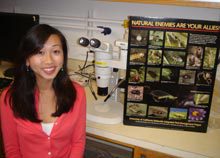Andrea Chiem L&S Sciences
Physiological Costs for Cabbage Aphids Sequestering Glucosinolates
Studies have shown that cabbage aphids (Brevicoryne brassicae) that eat black mustard (Brassica nigra) can sequester toxic compounds to ward off their predators. This summer, I am building on these studies by examining the eco-physiological costs to aphids of processing and sequestering these toxins. The concentrations of the toxins will be analyzed to determine the difference in chemical load for aphids that eat broccoli (Brassica oleracea) versus mustard. My main goal is to study the physiological costs of this chemical load by examining differences in development and reproduction of aphids on the two food sources. The results of these experiments will be important in discovering methods to study and control agricultural aphid populations in a sustainable manner.
Message To Sponsor
I am grateful to be a part of the SURF program because it allows me to focus solely on my research this summer without distractions. I hope that I will be able to obtain significant results while learning more about herbivore and host interactions in landscape ecology. Prior to working in the Kremen lab, I knew little about agricultural pests and their effects on the environment. However, after working in the lab for almost a year, I have learned so much and my interest for environmental science has truly deepened. Through SURF, I intend on taking my interests to the next level and learning more about the professional realm of research.